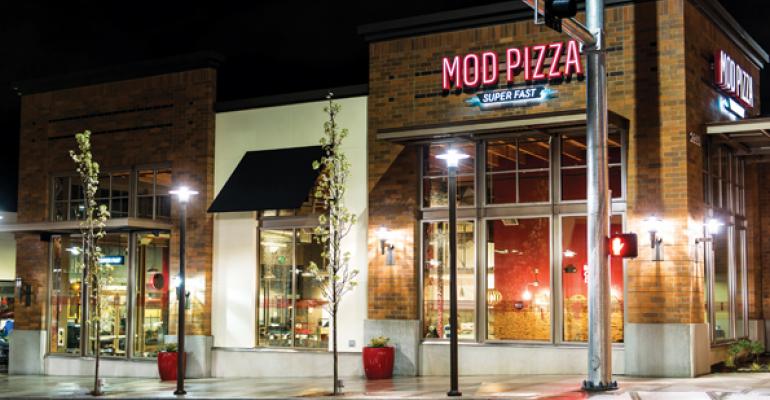MOD Pizza has closed on a round of financing led by private-equity fund PWP Growth Equity, along with existing shareholders, which is expected to top $40 million, the company said Thursday.
With the deal, MOD has raised more than $70 million in equity, which will help accelerate company-owned restaurant growth for the 32-unit fast-casual chain.
Bellevue, Wash.-based MOD operates in Washington, Oregon, California, Arizona, Colorado and Texas, and plans to double its unit count by the end of June. It aims to reach 100 locations before the end of 2015, as it moves into the Midwest and East Coast.
“MOD has always focused on building for the long term, and this infusion of capital will allow us to invest significantly in strengthening our business as we accelerate the opening of company-owned stores across the country,” Scott Svenson, MOD co-founder and CEO, said in a statement.
“The PWP Growth Equity team brings an enormous amount of value to MOD, including a successful track record of development and an impressive list of consumer brands,” he added. “Most importantly, they fully embrace the MOD culture and support our commitment to building a purpose-led organization.”
PWP Growth Equity is managed by New York-based Perella Weinberg Partners, which invests in growth-oriented, lower-middle market companies. Cascadia Capital acted as advisors on the deal. MOD is the first restaurant investment for PWP, officials said, though the firm has extensive experience in the retail space and other consumer-related businesses.
With the investment, David Ferguson and Chip Baird, both co-heads of PWP Growth Equity, will join MOD’s board of directors, the company said.
“Over the past seven years, MOD has diligently built an organization to support significant expansion while maintaining its unique and dynamic culture,” Ferguson said in a statement. “With this significant investment, we are confident that MOD will be able to clearly establish itself as the leader in the fast-casual pizza category.”
The equity funding follows a $15 million injection MOD received in 2014 from private investors that included Nigel Travis, chairman and CEO of Dunkin’ Brands Group Inc., and Spencer Rascoff, CEO of the real estate website Zillow.
Founded in 2007, MOD — an acronym for Made On Demand — was one of the first of a new generation of fast-casual pizza players, which are built on a Chipotle-style model of building your own pizza baked in minutes, along with hand-tossed salads.
Fast-casual pizza is a rapidly growing niche, with chains like Blaze Pizza, Pieology, Project Pie, PizzaRev, Pie Five Pizza Co., Uncle Maddio’s and Your Pie battling for national domination — and attracting serious investors.
Private-equity firm Lee Equity Partners holds a stake in Project Pie, for example. Your Pie has funding from Georgia Oak Partners. Chipotle Mexican Grill has backed Pizzeria Locale, and Buffalo Wild Wings is behind PizzaRev.
Earlier this week, nine-unit Washington, D.C.-based &pizza announced a $10 million investment round.
Unlike most of the other fast-casual pizza players, which depend heavily on franchise growth, MOD has grown mostly as a company-owned chain, although it launched a franchise program in 2013.
MOD’s board also includes Jim Alling, chief operating officer of T-Mobile and the former president of Starbucks International and Starbucks North America; Nader Naini, founding general partner of Frasier Healthcare Ventures; and Lindsey Schwartz, CEO of Schwartz Brothers Restaurants and Bakery.
Advisory board members include Howard Behar, another former president of Starbucks North America and Starbucks International; Adam Brotman, Starbucks chief digital officer; Paul Twohig, president of Dunkin’ Donuts; and Gerry Adams, partner and head of hospitality group for accounting firm Peterson Sullivan.
Svenson and his wife Ally Svenson, who is also on the board, previously co-founded the U.K.-based Seattle Coffee Company, which they later sold to Starbucks, and the Italian deli chain Carluccio’s Ltd., also in the U.K., which later went public.
Contact Lisa Jennings at [email protected].
Follow her on Twitter: @livetodineout





